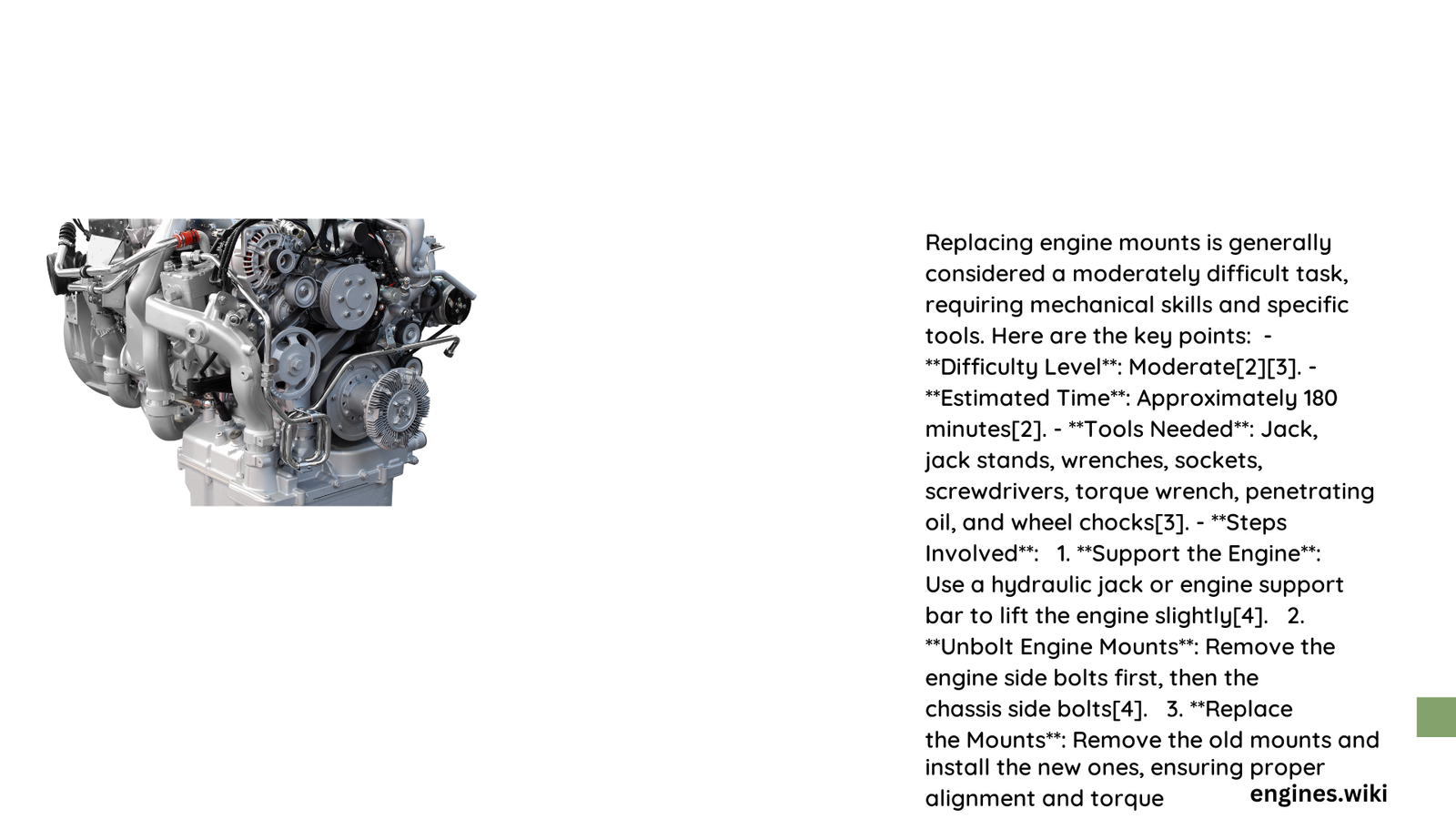Replacing engine mounts can be a challenging yet achievable task for automotive enthusiasts with moderate mechanical skills. While not an extremely complex repair, it requires specific tools, mechanical knowledge, and careful execution. The difficulty varies depending on vehicle make, model, and the mechanic’s experience level. Some vehicle configurations demand more expertise, potentially making the job more intricate than a simple bolt-on replacement.
What Makes Engine Mount Replacement Challenging?
Complexity of Vehicle Design
Different vehicles present unique challenges in accessing and replacing engine mounts. Factors influencing difficulty include:
- Vehicle Make and Model: Luxury and complex engineering vehicles might require more intricate procedures
- Engine Configuration: Transverse or longitudinal engine layouts impact accessibility
- Required Tools: Specialized equipment might be necessary
Skill Level Required
| Skill Category | Description | Difficulty Rating |
|---|---|---|
| Basic Mechanics | Simple hand tools, basic understanding | Low |
| Intermediate | Engine support techniques, torque specifications | Medium |
| Advanced | Complex mounting systems, precise alignment | High |
What Tools Do You Need?
Essential tools for engine mount replacement include:
- Hydraulic jack
- Jack stands
- Torque wrench
- Socket set
- Penetrating lubricant
- Engine support bar
- Safety equipment (gloves, glasses)
How Difficult Is the Actual Replacement Process?

Step-by-Step Breakdown
Preparation Stage
- Secure vehicle on level ground
- Disconnect battery
- Lift vehicle safely
- Support engine weight
Removal Process
- Locate existing engine mounts
- Remove mounting bolts
- Carefully extract old mounts
- Clean mounting surfaces
Installation Stage
- Position new engine mounts
- Align precisely
- Hand-tighten mounting bolts
- Apply manufacturer’s specified torque
What Are Potential Challenges?
Common Complications
- Rusted Bolts: Can make removal extremely difficult
- Limited Workspace: Tight engine compartments restrict movement
- Precise Alignment: Critical for preventing future issues
- Weight Management: Properly supporting engine weight
Cost Considerations
Replacement Expenses
| Expense Type | DIY Cost | Professional Repair |
|---|---|---|
| Parts | $50 – $300 | $50 – $300 |
| Labor | $0 | $200 – $500 |
| Total | $50 – $300 | $250 – $800 |
When Should You Seek Professional Help?
Indicators for Professional Assistance
- Limited mechanical experience
- Complex vehicle design
- Lack of specialized tools
- Uncertainty about proper procedures
Warning Signs of Failing Engine Mounts
Symptoms to Watch
- Excessive engine vibration
- Clunking noises during acceleration
- Visible mount deterioration
- Engine movement under load
Final Recommendations
Replacing engine mounts can be moderately challenging. Success depends on:
– Mechanical aptitude
– Available tools
– Vehicle complexity
– Willingness to learn
Pro Tip: If uncertain, consult a professional mechanic to avoid potential costly mistakes.
Safety First
Always prioritize personal safety:
– Use proper lifting equipment
– Wear protective gear
– Work in a well-ventilated area
– Follow manufacturer guidelines
Reference:
– AutoZone Repair Guide
– Professional Mechanic Forums
– Vehicle Specific Repair Manuals
